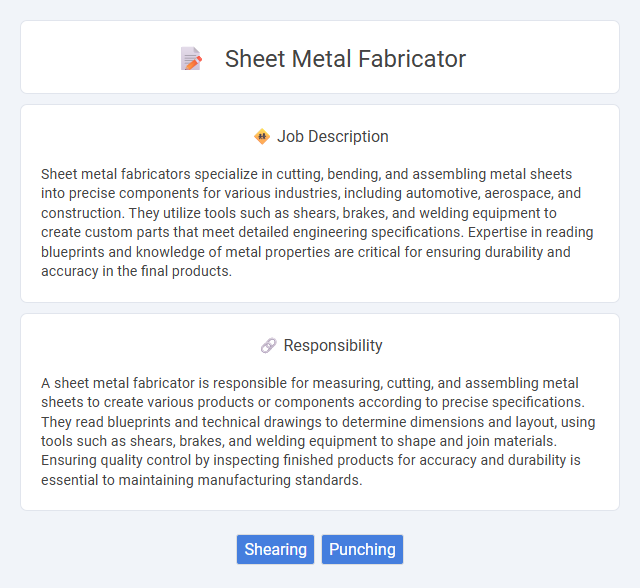
Sheet metal fabricators specialize in cutting, bending, and assembling metal sheets into precise components for various industries, including automotive, aerospace, and construction. They utilize tools such as shears, brakes, and welding equipment to create custom parts that meet detailed engineering specifications. Expertise in reading blueprints and knowledge of metal properties are critical for ensuring durability and accuracy in the final products.
Individuals with good manual dexterity and physical stamina are likely suitable for a sheet metal fabricator role, as the job frequently involves handling heavy materials and precise cutting or shaping tasks. Those with strong spatial awareness and problem-solving skills probably excel in this position due to the need for accurate measurements and fabrication techniques. People with limited mobility or poor attention to detail may find this job challenging, making it less suitable for them.
Qualification
A sheet metal fabricator must possess strong technical skills in reading blueprints, understanding material specifications, and operating various metalworking tools such as shears, brakes, and welding equipment. Proficiency in welding techniques and knowledge of safety protocols are essential to ensure precision and compliance with industry standards. Certifications like OSHA safety training and experience with CAD software or CNC machinery significantly enhance employability in this role.
Responsibility
A sheet metal fabricator is responsible for measuring, cutting, and assembling metal sheets to create various products or components according to precise specifications. They read blueprints and technical drawings to determine dimensions and layout, using tools such as shears, brakes, and welding equipment to shape and join materials. Ensuring quality control by inspecting finished products for accuracy and durability is essential to maintaining manufacturing standards.
Benefit
Sheet metal fabricators likely enjoy benefits such as competitive salaries and opportunities for skill development, which can enhance career growth. Access to health insurance and retirement plans may also be common, providing financial security and peace of mind. Jobs in this field probably offer hands-on experience with advanced machinery, potentially increasing employability in related industries.
Challenge
The sheet metal fabricator job likely involves challenges related to precision and accuracy in cutting, shaping, and assembling metal components. Workers probably face difficulties adapting to complex blueprints and specifications while maintaining safety standards. There may be frequent problem-solving requirements due to material inconsistencies or equipment limitations.
Career Advancement
Sheet metal fabricators can significantly enhance their career by mastering advanced welding techniques, computer-aided design (CAD) software, and precision metal forming technologies. Gaining certifications such as Certified Welding Inspector (CWI) or Certified Sheet Metal Worker improves job prospects and salary potential. Progressing into roles like project manager, quality control supervisor, or fabrication engineer requires a combination of technical expertise and leadership skills.
Key Terms
Shearing
Sheet metal fabricators specialize in cutting and shaping metal sheets to precise specifications, with shearing being a critical process that involves straight cutting of large metal sheets using a shear machine. Mastery in shearing ensures clean, accurate cuts that minimize material waste and prepare components for further fabrication stages like bending or welding. Proficiency in interpreting technical blueprints and maintaining shearing equipment enhances overall production efficiency and quality in metal fabrication projects.
Punching
A sheet metal fabricator specializing in punching operates CNC punch presses to create precise holes, slots, and shapes in metal sheets, ensuring accurate dimensions according to technical drawings. Mastery of programming and setup of punching machines is essential for efficient production and minimizing material waste. Proficiency in interpreting blueprints and using CAD software enhances precision and productivity in metal fabrication projects.
 kuljobs.com
kuljobs.com